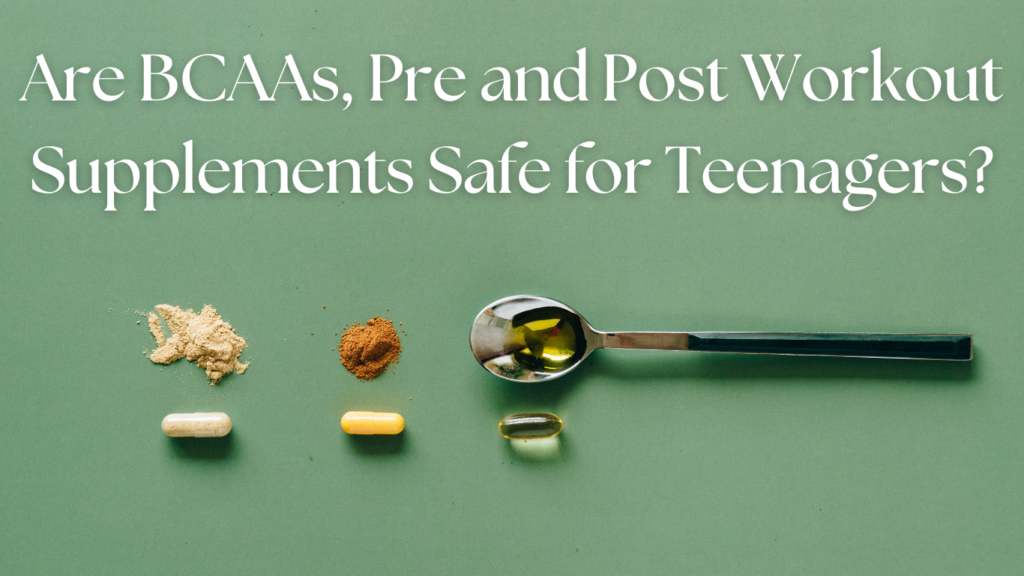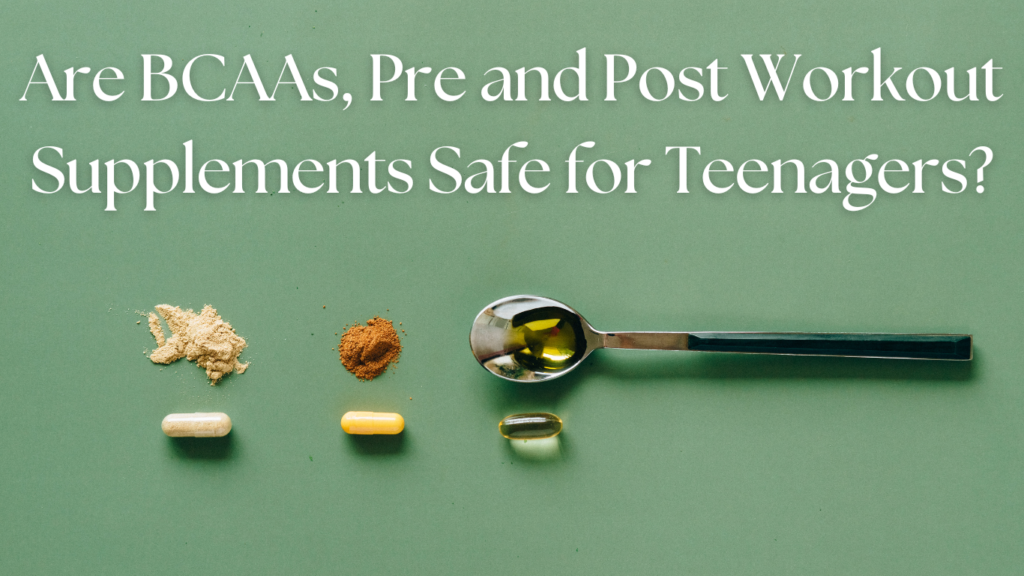
BCAAs (Branched-Chain Amino Acids)
are popular supplements that include leucine, isoleucine, and valine. They are known to support muscle recovery, reduce exercise fatigue, and improve exercise performance. However, when considering their use for teenagers, it’s essential to weigh both the benefits and potential concerns.
Safety and Benefits:
- Muscle Recovery: BCAAs can help with muscle recovery and reduce soreness, which is beneficial for active teenagers engaged in intense training.
- Protein Synthesis: They support protein synthesis, promoting muscle growth and repair.
- Energy: BCAAs can serve as an energy source during prolonged exercise, potentially reducing fatigue.
Potential Concerns:
- Dosage: The appropriate dosage for teenagers is not well-established, and excessive intake can lead to imbalances in amino acids.
- Balanced Diet: Teenagers should ideally get sufficient BCAAs from a balanced diet rich in protein (e.g., meat, dairy, legumes, and eggs).
Recommendation:
While BCAAs can be beneficial, they should be used with caution. It’s crucial to consult with a healthcare provider or a registered dietitian before starting any supplement regimen.
Pre-Workout Supplements:
- Caffeine: In moderate amounts, caffeine can improve focus and endurance. However, teenagers should avoid high doses and energy drinks that contain excessive caffeine.
- Recommendation: A small amount of caffeine (e.g., from tea or coffee) can be consumed, but it’s best to consult a healthcare provider.
- Creatine: Creatine monohydrate is one of the most researched supplements, known for improving strength and power.
- Safety: Generally considered safe for teenagers when taken in recommended doses (3-5 grams per day). It’s crucial to ensure proper hydration.
- Recommendation: Consult with a healthcare provider before use.
- Beta-Alanine: Helps buffer lactic acid in muscles, which can improve high-intensity exercise performance.
- Safety: Generally safe, but can cause a harmless tingling sensation.
- Recommendation: Consult with a healthcare provider to determine appropriate dosing.
Post-Workout Supplements:
- Protein Powder: Whey or plant-based protein powders can help meet protein needs, especially if dietary intake is insufficient.
- Safety: Safe when used as part of a balanced diet.
- Recommendation: Opt for high-quality protein powders without added sugars or artificial additives.
- Electrolytes: Important for rehydration and replenishing minerals lost through sweat.
- Safety: Generally safe when used as directed.
- Recommendation: Look for electrolyte supplements with a balanced mix of sodium, potassium, magnesium, and calcium.
- Omega-3 Fatty Acids: Supports overall health, reduces inflammation, and aids in recovery.
- Sources: Fish oil supplements or algae-based supplements for vegetarians.
- Recommendation: Consult with a healthcare provider for appropriate dosing.
General Recommendations
- Balanced Diet: Emphasize the importance of a well-balanced diet rich in whole foods.
- Hydration: Ensure adequate hydration before, during, and after workouts.
- Professional Guidance: Always seek advice from healthcare providers or registered dietitians before starting any supplement.
Conclusion
While supplements can offer benefits, the foundation of a teenager’s nutrition should be a balanced diet. Supplements like BCAAs, protein powders, and electrolytes can be useful, but it’s crucial to approach their use with caution and professional guidance. Always prioritize safety, proper dosing, and the overall health and well-being of the student athlete.
SOURCES
Scientific Literature and Reviews
- Journal of the International Society of Sports Nutrition (JISSN): Various articles on the safety and efficacy of BCAAs, creatine, and other supplements for athletes.
- E.g., “International Society of Sports Nutrition Position Stand: Safety and Efficacy of Creatine Supplementation in Exercise, Sport, and Medicine” .
- PubMed: Database of biomedical literature for peer-reviewed research on specific supplements.
- Search terms like “BCAA safety in adolescents,” “creatine supplementation in teenagers,” and “caffeine effects on youth.”
Expert Recommendations
- Dr. Stacy Sims: Known for her work on nutrition and hydration for female athletes, particularly focusing on the specific needs of young athletes.
- Sims, S.T. (2016). “ROAR: How to Match Your Food and Fitness to Your Unique Female Physiology for Optimum Performance, Great Health, and a Strong, Lean Body for Life.”
- American Academy of Pediatrics (AAP): Provides guidelines and position statements on adolescent nutrition and safe supplement use.
- AAP Council on Sports Medicine and Fitness (2019). “Sports Drinks and Energy Drinks for Children and Adolescents: Are They Appropriate?”
Government and Health Organizations
- National Institutes of Health (NIH): Offers detailed information on dietary supplements, including benefits, risks, and recommended dosages.
- NIH Office of Dietary Supplements: Fact sheets on specific supplements like BCAAs, creatine, and omega-3 fatty acids.
- Food and Drug Administration (FDA): Provides regulatory information and safety guidelines for dietary supplements.
- FDA Consumer Updates: “What You Need to Know about Dietary Supplements.”
General Consensus and Textbooks
- “Sports Nutrition: A Practice Manual for Professionals” by the Academy of Nutrition and Dietetics: Widely used reference that covers sports nutrition, including the use of supplements.
- Rodriguez, N.R., DiMarco, N.M., Langley, S. (2009). “Nutrition and Athletic Performance.”
- “Essentials of Strength Training and Conditioning” by the National Strength and Conditioning Association (NSCA): Comprehensive guide that includes information on nutritional strategies for athletes.
- Haff, G.G., Triplett, N.T. (2015). “Essentials of Strength Training and Conditioning.”
The combination of these sources provides a well-rounded view of the safety and efficacy of supplements for high school athletes. Always ensure that any recommendations are tailored to individual needs and that professional guidance is sought when necessary.

